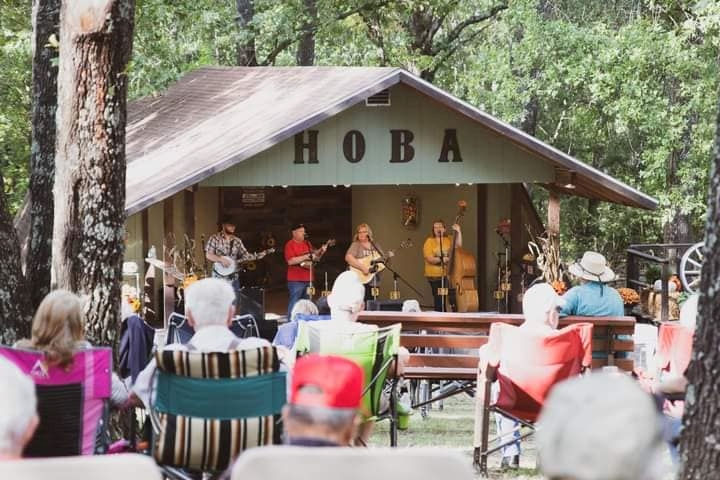HOBA: The Heart of Bluegrass
- Daniel Sheehan
- Dec 1, 2023
- 3 min read

Twelve-year-old Teresa Romans was sitting in math class in West Plains, Missouri, when she received a note from Ethel Willard, an elementary school teacher. Willard spent her summer vacations traveling around Missouri and playing bluegrass festivals with her husband, Jim. Willard had caught wind that Romans came from a family of bluegrass players and pulled her out of class to compile a list of local musicians and invite them to a jam night at the Howell County Courthouse. Shortly after, they began hosting regular gatherings and laying plans for their own festival.

But that was in 1979. Over forty years later, Heart of the Ozarks Bluegrass Association (HOBA) has grown into an educational nonprofit dedicated to preserving and celebrating bluegrass music in West Plains. These days, HOBA hosts biannual 3-day festivals on their property in addition to their weekly jam sessions. Attendees can camp overnight during the festivals.
Located in the center (or “heart”) of the Ozark Mountains, West Plains has an active music scene that is well aware of its historical roots. Settlers from Southern Appalachia came to the region in the early 18th century, bringing their music and storytelling traditions.
As years pass, traditions like these tend to be lost or otherwise forgotten. Communities lose sight of what once brought them together. HOBA’s mission is to keep the bluegrass tradition in the Ozarks alive and bring people together to celebrate the region’s history. The key to preservation, according to HOBA, is investing in the youth.
HOBA offers a variety of workshops that focus on teaching the history of bluegrass alongside musical lessons. The latest iteration of these educational projects is the Bluegrass in the Schools program. Several association members visit nearby schools where they perform small concerts, followed by an “instrument petting zoo,” as Teresa Romans calls it.
“The kids touch, hold, feel, and play on the instruments,” Romans says. “Then they pick what they think they might be most interested in and sit down with some of the board members, and they have the very extreme beginner’s lesson. They are open to new ideas and learning and soak it up like a sponge.”
For many students, it is their first time interacting with any instrument. Providing this avenue into the bluegrass world is the first step in HOBA’s mission to expose the musical tradition to a new generation of potential players. HOBA currently has programs in two high schools, one of which has produced a band that went on to compete against musicians from across Missouri. “I’m not sure the judges knew exactly what to do with them, but they were impressed,” Romans remarked.

The association aims to take this introduction one step further by loaning donated instruments to kids to allow them to see if they are interested in pursuing music. HOBA partners with local music store West Plains Music to make necessary repairs to donated instruments. “Instruments are expensive, and a lot of parents can’t afford them, especially if the child isn’t going to keep playing,” Romans explains.
HOBA’s origin story and objective speak to the intergenerational, family-centric nature of bluegrass customs. “Most of our volunteers are second and third-generation pickers,” Romans says of the workshop instructors. “Most of them were raised with bluegrass in the home and even church. Hardworking, kind, decent people who get excited to share with the kids.”
Vice President Sharry Lovan, who runs the Bluegrass in the Schools program, believes that appealing to the younger audience is vital to sparking their interest in the association. Teaching kids how to play mainstream songs they are already familiar with, such as Old Crow Medicine Show’s “Wagon Wheel,” opens the door for conversation about the genre's history.
“If we can teach these children that this type of music is worth preserving, that it is our heritage and their heritage, then we can rest assured the music will go on long after we are gone,” Lovans elaborates.
Romans also sees music as a cornerstone of the human experience. “Much in the way our Daddy taught us how to change the oil on the car, or how Momma showed us how to make bread. It’s part of our heritage and upbringing, and I would hate to see it disappear.”
Preservation is crucial for a community that is built on music and storytelling. From the 1979 courthouse jam sessions to today's festivals, HOBA ensures that the heart of the Ozarks keeps beating for years to come.





Comments